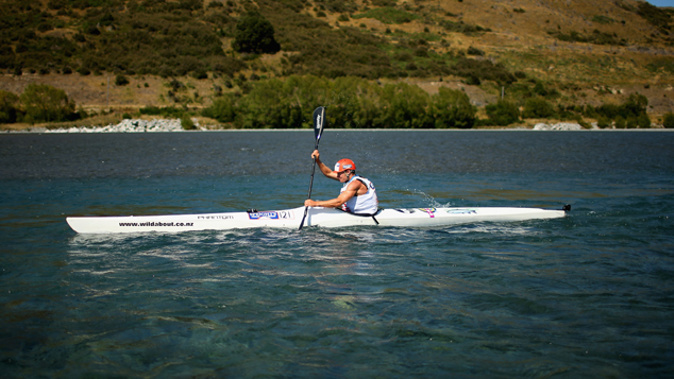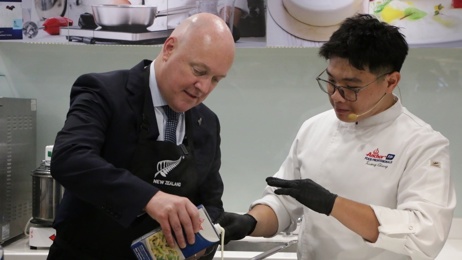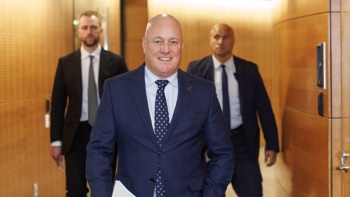
It's a question that triathletes often get asked: "did you do the Coast to Coast this year?"
Then comes the polite explanation that their sport is swim, bike, run, rather than the multisporter's efforts of kayak, bike, run. From time to time, there is crossover between the sports, but largely speaking, it's a different world with different cultures and communities.
There's been the odd year when a Weekend Warrior attempts both the Coast to Coast and Ironman in the same year, and with the short turnaround between the races, getting to the finish line in both is a remarkable feat. But it's not something you see often- particularly at the sharp end of the fields. The one notable exception in the pro field this year was Sam Clark who backed up his stunning win in the Coast to Coast with a start in Ironman New Zealand. More on that later.
New Zealanders have excelled globally in both multisport and triathlon and closely related off-shoots like Adventure Racing and Xterra. But then some are closer relatives than others. Triathlon and Xterra and are fairly natural fit- Hamish Carter backed up his 2004 Olympic gold medal with an Xterra (off-road triathlon) World title in 2006. Numerous top multisporters have gone on to win adventure racing world titles.
Until quite recently, the only thing in common between triathlon and multisport - other than great endurance - seemed to be the road cycle. While the walls haven't been smashed down completely, recent years have seen an increase in top name competitors jumping across from multisport to triathlon.
Coast to Coast Race Director Richard Ussher may have set the ball rolling when he successfully dipped his toes in iron distance triathlons. The former Winter Olympic Freestyle Skier jumped the fence fairly successfully and then jumped back again.
There's an assumption made by many that triathlon offers greater opportunities for endurance athletes to earn a living, but Ussher says that isn't necessarily the case. "If anything, it's harder. The prize money is spread around more events and there are more competitors chasing it. For me it was about the challenge of seeing how I stacked up against other endurance athletes on a global stage." Pretty well as it turned out. The five times Coast to Coast champion took first place at Challenge Wanaka in 2010, and briefly also had the fastest time over the iron distance for a kiwi when he went just over 8 hours 2 minutes at Challenge Roth in Germany.
Until 2016, Wanaka's Dougal Allan was becoming to New Zealand events what former the legendary frenchman Raymond Poulidor was to the Tour de France: "The Eternal Second". Runner-up was becoming a familiar placing for Allan in both the Coast to Coast, and then when he crossed over to iron distance racing- at Challenge Wanaka and Ironman Sweden. That all changed with February's storming victory in Wanaka- a win he followed up with a seventh placing and bike course record at Ironman New Zealand just a fortnight later.
Allan admits that he initially pined for it badly when he first walked away from Coast to Coast, but those emotions slowly faded as his tri successes grew. "If I really dig deep into my feelings on my sport, my true love lies in the off-road formats of endurance sport, but for the time being it would be silly to walk away from triathlon where I'm starting to see success."
Richard Ussher admits that motivation ultimately became a big challenge for him in triathlon. "We're so lucky in New Zealand that we have access to places like the Coast to Coast course and where the Godzone goes and all of the different events like that. Internationally with the adventure racing and multisport you get to see the absolute best places in the countries you go to- the places that no-one else gets to see. The lifestyle factor rather than purely the competitive element was always a massive drawcard for me."
Sam Clark takes a more pragmatic business-like view of his cross over into triathlon. The Bay of Plenty multisporter nailed an impressive maiden Coast to Coast win in February, and then raced his third ironman race in Taupo just three weeks later. "My heart is still firmly set in multisport, but these days there aren't enough races or prize money to chase multisport solely as a feasible career option. We looked around at other long distance races and 70.3 and Ironman presented themselves as pretty good options." Clark is currently eyeing three possible Ironman races in Europe in the middle of the year, but some adventure racing in China later on is also a possibility.
What about the women ? It's a bit of a stretch to call Chrissie Wellington and Andrea Hewitt hardcore multisporters, but they did dip their toes in the Waimak before embarking on their impressive triathlon careers. Wellington was an unknown English girl on her OE when she entered the Coast to Coast on a whim. She was as surprised as anyone to find herself leading by a long way after day one of the the two day race- a lead she relinquished on day two due to her complete lack of experience in a kayak. It was possibly the last time she ever gave up a lead as she went on to a remarkable career in Ironman.
Doctor John Hellemans spent a long time twisting the arm of South Brighton surf life saver Andrea Hewitt to give triathlon a crack. She finally relented, cutting a deal with the respected triathlon coach that she could do the Coast to Coast first, before entering into triathlon. Her one-off visit to the Coast to Coast resulted in a fourth placing in the one day race, but in the blink of an eye, she was the under 23 world triathlon champion. The pint sized Cantab is now counting down to her third Olympic appearance.
The most high profile and talked about switch in recent times centered on the ultimately unsuccessful bid for a place in the Rio Olympics triathlon team by Wanaka's Brayden Currie. Fellow Coast to Coasters nicknamed him Gollum for his uncanny ability to run and slide over the rocks in the mountain run on the way to his three titles in the iconic race. With victories in both the Tauranga Half and the Taupo 70.3, there is little doubt that Currie has the ability to push to the very top of the sport at both half and full ironman distances. The shorter distance is a whole different ball game, and in reality, Gollum quite simply didn't give himself enough time to adjust, and in the end fell well short of achieving his courageous and admirable goal.
Currie's campaign was ultimately undone by the discipline that always proves the biggest challenge for multisporters making the switch: the swim. This year's Ironman New Zealand perhaps lays bare the gap between those fully devoted to swim-bike-run, and the toe-dippers. Christchurch's Dylan McNeice was first out of the water after the 3.8 kilometre swim in a time of 44 minutes and 54 seconds. Sam Clark and Dougal Allan took over 56 minutes to complete the course.
Perhaps it's a little unfair to compare them to McNiece who was afterall the first out of the water at the Ironman World Champs in Kona- Hawaii last year. A fairer comparison is may be race winner Cameron Brown who swam around 48 and a half minutes- still a long way clear of Clark and Allan. There is no doubting the bike-run abilities of the pair, and a combination of patience, perseverance and coaching should see them knock plenty off their swim times in the long term, if they stick with it.
You can't help admire Brayden Currie's pluck and tenacity, but at 29 years of age, it may have been prudent to have slipped into Olympic distance racing a couple of years earlier. Tough choices- that would've robbed him of a couple of Coast to Coast titles. Time isn't an issue for Bay of Plenty's Hayden Wilde. The 18 year old raised eyebrows on his way to victory in this year's Coast to Coast two day race. After leading at the end of day one, he was asked about stepping up to the One Day Race next year. He killed that idea stone dead with plans to devote himself to standard distance triathlons in a bid to qualify for the 2020 Tokyo Olympics!
With an Xterra age group world title to his name already, Triathlon New Zealand is taking notice. "I've had positive feedback about my run and bike splits but now they're looking at me and saying ok- we just need to get this guy's swim up and he'll be not too bad." In terms of raw talent, Wilde looks like the real deal, but missing the bike pack has proven costly in recent races. "If you're 40 seconds behind the bike pack, it's hard to catch runners who are doing 15 minutes over 5ks." A recent move from Whakatane to Tauranga should provide more opportunity to improve his swim times with a bigger talent pool and more squads to work with.
Sam Clark rates Wilde as an incredible talent. "He just tears our local cycle bunch to shreds every week. And his swim has advanced incredibly quickly over about 3 and a half months. Definitely watch this space." Richard Ussher believes Wilde's goal definitely looks attainable. "I think he's a massive talent and won't be the least bit surprised if we see him at the 2020 Olympics".
The days of consistent podiums on the world stage have long since passed for New Zealand triathlon in the men's olympic distance. Since the retirements of Hamish Carter, Bevan Docherty and Kris Gemmell, it's been a pretty lean run.
Developing talent from within is hugely important, but it could well be that the opportunity is also there to cherry pick from Multisport. The talent pool runs deep.
Take your Radio, Podcasts and Music with you









